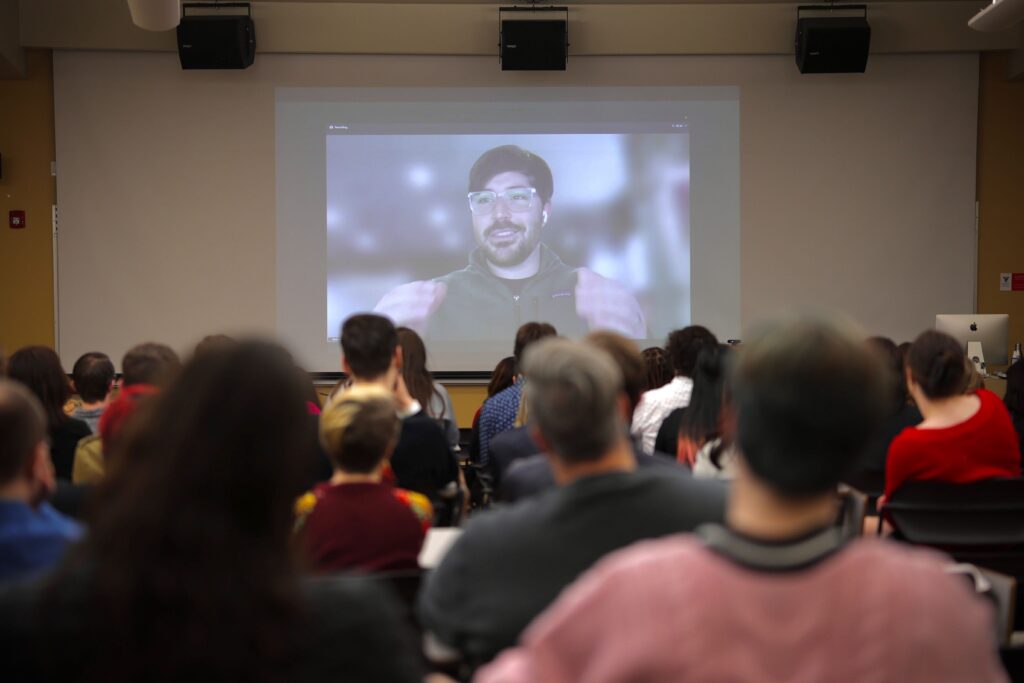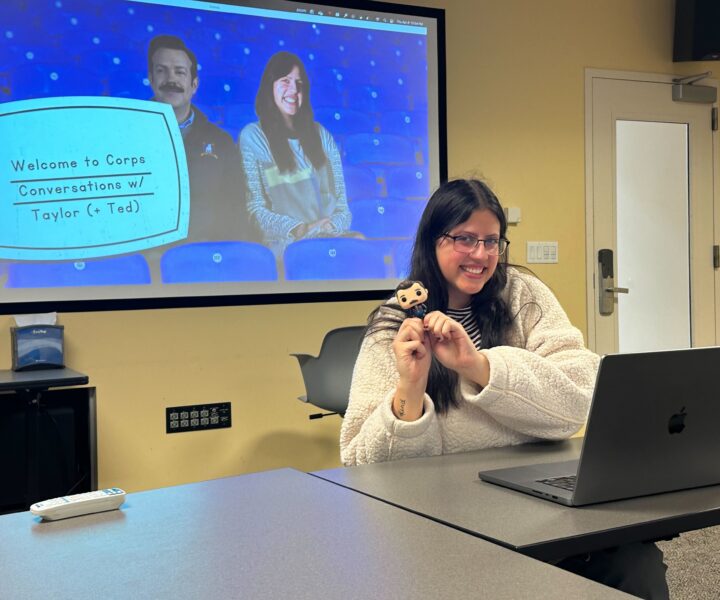
Imposter syndrome plagues the workplace in all forms. Comparing yourself to co-workers and their progress on projects or tasks can be overwhelming. According to Harvard Business Review, imposter syndrome is, “a collection of feelings of inadequacy that persist despite evident success.” Imposter syndrome can also be referred to as imposter phenomenon, since it isn’t technically an illness and is mostly about a false self-perception. Essentially, no matter how many successes you have, you never really feel like you deserve them.
Once I was hired as an Apprentice here at the Digital Corps, I remember my initial feelings of imposter syndrome. Being surrounded by talented people can make you feel inadequate at your job, especially if everyone around you has been at the company longer than you.
After many discussions with my co-workers, I learned that almost everyone has had the same experience as me. But how did they cope with this feeling of inadequacy? I held a conversation with a few co-workers I look up to on how they manage imposter syndrome and how they’re working to overcome it.
Coping With Imposter Syndrome
The Digital Corps does an excellent job of discussing imposter syndrome and how to deal with the emotions of self-doubt in a series of meetings called Soft Skills. In these meetings, we discuss the importance of dealing with self-doubt, and how every student deserves to be here at the Digital Corps. Taylor Staples, a Communications Apprentice, expressed her experience on how she deals with imposter Syndrome.

Staples has been a part of Her Campus, WCRD Radio, and the Newman Center. She was hired in the spring of 2022 and struggled with imposter syndrome as early as high school.
“It was more about grades in high school because we never had clubs centered around media opportunities. Then immediately after joining college, my friends were infinitely ahead of me. One of my friends was in six clubs, and the president of the student government here,” Staples sighed and leaned back in her chair.
Staples explained how comparing herself to others caused the issue of imposter syndrome. People who struggle with imposter syndrome tend to unfairly compare themselves to others. Although Staples often compared herself to her peers, she also explained how it can be motivating.
“It’s sort of a double-edged sword because I felt like an imposter, but it also motivated me to do more,” said Staples.
Imposter syndrome can bring positives and negatives into the workplace. Being seen as successful and deserving of your place in a work environment is a necessity for most people to thrive in their workplace. Workplace validation is another great way to empower people to feel accepted while at work; nothing makes employees feel more uncomfortable than feeling like they don’t belong.
Celebrating successes is something that also isn’t always discussed in the workplace. Truly accepting your accomplishments is challenging when you don’t take the time to accept them. A wonderful way to celebrate your successes and accept your accomplishments is celebrating with family and friends and sharing your successes with them.
Accomplishments I share with my family or friends are always a bigger deal to them than me, mostly because I’m constantly striving for more. I get used to achieving something and then moving onto the next, but be present and share special moments with the people that mean something to you!
Dealing With It

Dan Chepkwony, a Development Specialist, is also someone I look up to at the Digital Corps. Becoming a Specialist at Digital Corps means pitching to our staff members and proving why you deserve your promotion. Chepkwony describes how hard it is to accept your successes, especially when dealing with imposter syndrome.
“It’s difficult to accept your successes when you’re already uncomfortable especially being in the computer science industry. In school, I would usually compensate by being good, and getting good grades. However, in this industry, it’s been hard to be better than everyone else, so there’s no way for me to convince myself that I’m good enough,” Chepkwony sighed defeatedly.
Heidi Grant from Harvard Business Review wrote an article titled, “To Succeed, Forget Self-Esteem” and writes, “It’s not surprising that self-compassion leads, as many studies show, to higher levels of personal well-being, optimism and happiness, and to less anxiety and depression.” Changing your mindset when it comes to your shortcomings can boost your self-confidence. Accepting your failures and learning from them can change the way you view yourself.
Creating validation and self-worth using grades and school projects is another common theme many imposter syndrome victims go through. Being successful is commonly equated to one’s self-worth. A common theme at the Digital Corps is students feeling worthless after failure. Again, changing this mindset is helpful when viewing yourself as an imposter in the workplace. Chepkwony describes how he copes with his feelings of inadequacy and changes his mindset.
“I usually just pull myself out of it and tell myself I’m good enough, accepting the fact that you can do things other people in the room can’t. Everybody is good at something, just learn to accept the fact people may be better or worse at it than you,” said Chepkwony.
His advice helped me when I felt out of place in meetings or hanging out with peers outside of work. Accepting the reality that I am good at what I do, and changing my mindset every time I feel like an imposter has helped me.
Personally, I deter myself away from comparing myself to others and think of my own experiences as a writer. I think including other successful people while analyzing my journey will almost always lead to a rabbit-hole effect of never thinking I’m good enough. We will continuously find ways to point out our own imperfections and mistakes. The easiest way to get over them is to accept them and move on. Mistakes are meant to be learning curves.
Staff Members and Imposter Syndrome

Riley Paulsen, the Digital Corps Assistant Director, often leads Soft Skills sessions over imposter syndrome. Paulsen is always reminding students that they are capable of anything, depending on how far they’re willing to push themselves. He is often seen challenging students on tough projects and to think outside the box. Giving students the space to challenge themselves and overcome problems on certain projects allows students to realize their potential. This leads to students feeling empowered and they eventually overcome their imposter syndrome.
“The goal is to always find the students who can push us a little further, as well as we can push them further. I love seeing artists and designers come in, developers come in, who have different ways of thinking about things. These people are going to take over in the future and I’m just going to be left behind. That’s literally the goal.”
When he’s not working at the Digital Corps, Paulsen spends an extensive amount of time as a wedding photographer. Even though he has 14 years of wedding photography experience under his belt, he has struggled with comparing his photography to others.
“My best advice I can give for imposter syndrome is not to compare yourself to others. Just compare your work to your own, and just look at the progress you’ve made.”
New staff member, Elle Kreamer, is a Video Producer here at the Digital Corps. Kreamer joined the Digital Corps in January of 2023 and has worked heavily on Ball State University’s ongoing Lifetime Learning initiative. Kreamer came from a Journalism background and had gained video experience after her graduation from Indiana University in Bloomington, but still had to teach herself many elements of video and editing once she started working full-time.

“My actual education was not in video production, so honestly any video job that I had after graduation, I struggled with imposter syndrome. When collaborating with students I’m also learning with them when it comes to projects.”
Staff members at the Digital Corps are constantly learning themselves, and Kreamer does a great job of learning and guiding students in the right direction.
“When you start out in any field, it’s guaranteed that you’re going to feel like an imposter. So, comparing yourself to others isn’t exactly fair, especially when it comes to someone who has more experience than you.”
Kreamer’s advice reminded me that comparing yourself to someone who has more experience than you isn’t fair. You will eventually achieve the level of experience required to feel confident in your field of work. Just be patient with yourself!
Steps to Take
Acknowledging your employee’s accomplishments is key to seeing them excel. Gaining self-confidence allows workers to feel proud of their work and take ownership of their success. Here are three steps on how to implement self-confidence in the workplace and reduce imposter syndrome:
Separate Feelings from Work
Acknowledge that you’re in your workplace for a reason, you’re great at what you do! Whenever you feel negative self-talk in your mind or even out loud, stop yourself and think of everything you’ve accomplished.
Allow Yourself to Accept Your Failures
One of the key culprits for imposter syndrome is only acknowledging your failures. Failures mean that you’re one step closer to succeeding. Learn from your mistakes and keep trying; to be successful, you must make mistakes.
Put on a Show
Have you ever heard the term, fake it till you make it? Doing this will eventually set you apart from your colleagues, because pretending like you know what you’re doing will eventually lead to an abundance of confidence. My first semester on projects at the Digital Corps, I tried my hardest to act like I knew what I was doing. Eventually, I found myself where I am now with double the amount of confidence on projects.
At some point, everyone deals with imposter syndrome. Allowing yourself to accept your failures and learn from them is a fantastic way to start your journey toward self-confidence. Don’t forget to accept your successes, you earned them, so go celebrate!
Using the three steps of implementing this mindset in the workplace is an exciting way to help your employees, or colleagues. Mindset is key when dealing with imposter syndrome, and finding validation through work is draining. Workplace validation can be rewarding at times, but over time can become exhausting. Remember to celebrate your successes, as well as your colleagues!



